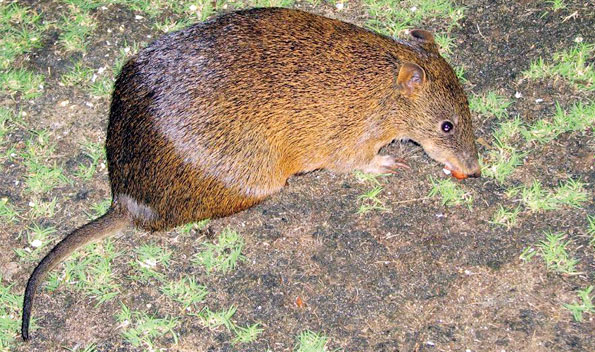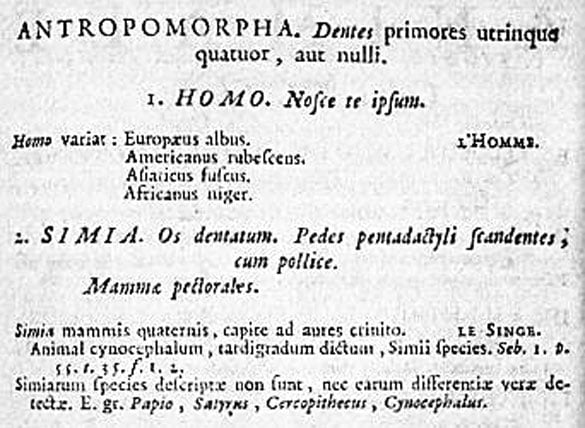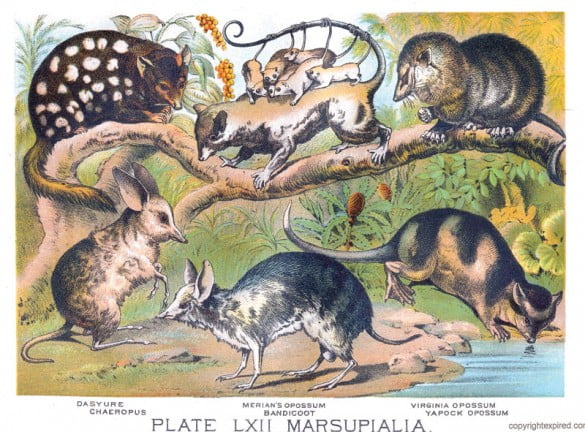And God said, Let us make man in our image, after our likeness: and let them have dominion over the fish of the sea, and over the fowl of the air, and over the cattle, and over all the earth, and over every creeping thing that creepeth upon the earth. – King James Bible: Genesis 1:26
There’s an exercise in a basic writing course I teach concerned with a balanced order of sentences within paragraphs giving examples and qualifiers. It goes something like this:
a. An estimated two billion people are malnourished.
b. Only man can read and write.
c. Only man can grow his own food.
d. Man is the most intelligent of the animals.
e. An estimated 1 billion people (18% of the world’s population) are illiterate.
There is one major sticking point: sentence d, the introductory sentence. Many folk refuse to believe that Homo sapiens (man) is a species of animal. Nor have they accepted that there are three basic choices for all matter.
I rarely expound on the life and work of Carl Linnaeus (1707–1778), the Swedish botanist, physician and zoologist, who laid the foundations for the modern system of binomial (two names) nomenclature (biological classification). The first part of the name identifies the genus to which the species belongs; the second part identifies the species within the genus.
For example, humans belong to the genus Homo and within this genus to the species Homo sapiens, a classification first included in Linnaeus’ Systema Naturae published in 1735.
Detail from the 6th edition of Systema Naturae (1748) describing Anthropomorpha with a division between Homo and Simia.
I ask students who are unable to accept that they are part of the animal kingdom to list a few characteristics of animals, vegetables and minerals.
There is general agreement that humans are not minerals, from below ground, and that unlike plants, we don’t have roots and get our nutrition from the soil.
Animals have several characteristics in common; apart from corals, we are mobile and have digestive systems, which involve the intake of nutrition through mouths and the excretion of waste materials through anuses.
With that generally agreed, we are free to focus on the writing task, but having spent rather too much time on reaching a level of acceptance of our place in Mother Nature’s Earth, we may have to continue in the next lesson.
Much of our behaviour is dictated by our belief systems, yet these in turn are determined by our understanding, whether ingrained by teachers or by seeming osmosis, of the language used. For example, what do you understand by the word ‘dominion’ in my quote above from the King James Bible? Or ‘rule’ in the New American Standard version, and ‘be masters of’ in the International Standard Version? In a negative sense, they could variously mean to conquer, to use, or to own.
However, because we have the power, the interpretation I prefer to believe is that these words mean ‘to nurture, care for and protect’. If we have an empathy with our pets, why can’t we display and practice a similar trait with other species?
According to data from 2004, Indonesia is home to nearly 700 mammals, more than any other country. Also, with just 1% of the Earth’s land area, Indonesia’s rainforests contain 10% of the world’s known plant species, 12% of mammal species and 17% – over 1500! – of all known bird species.
Note the use of the word ‘known’. Just recently, a new species of ‘walking’ shark was discovered in the waters of Halmahera (Maluku), and in the mountains of the same island a new rodent species, the Spiny Boki Mekot Rat, was discovered in September.
A few critically endangered species are known to most of us; the Sumatra’s tigers, rhinos and orangutans, for example. But what of those you’ve probably never heard of?
The International Union for Conservation of Nature (IUCN) maintains a Red List of Threatened Species to “evaluate the extinction risk of thousands of species and subspecies.” For an innumerate nincompoop like me, extracting data from the list is somewhat complex. However, the following is what I’ve gleaned about one group of Indonesian mammals, found on the east side of the Wallace line, which few will have heard of, let alone seen.
99 sub-species of marsupials are listed: bandicoot, cuscus, dasyure, dorcopsis, dingiso, pandemelon, possum, tree kangaroo, triok, wallaby.
Critically Endangered (CR) – species in imminent risk of extinction in the wild: 8
Endangered (EN) – species facing an extremely high risk of extinction in the wild: 14
Vulnerable (VU) – species facing a high risk of extinction in the wild: 17
Near Threatened (NT) – although not meeting any criteria that would categorize it as risking extinction, it is likely to do so in the future: 6
Data Deficient (DD) – may or may not be threatened: 3
Total: 48
In other words, just under half of Indonesia’s marsupials are currently considered at risk.
We all know the major causes; land clearances for forestry, plantations, mining, urbanisation, over-fishing and pollution. Man is the only species that fouls its own nest!
In his book Dieta Naturalis, Linnaeus wrote: “[Theologians decree] that man has a soul and that the animals are mere ‘aoutomata mechanica,’ but I believe they would be better advised that animals have a soul and that the difference is of nobility.”
Think on these things. We have a choice, be noble or stupid.
Here endeth my sermon.






